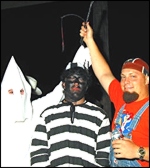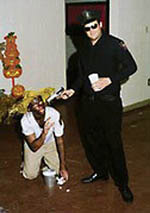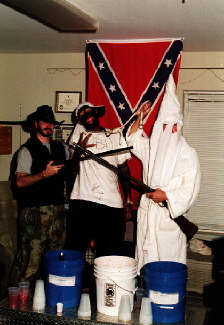Over My Shoulder #31: J.R. Hummel on the occupation and the insurgency in the border states during the American Civil War
Welcome to a special President’s Day edition of Over My Shoulder! The Ministry of Culture in this secessionist republic of one does not recognize President’s Day as a national holiday, but our Foreign Service thought that it might make interesting reading for our American neighbors. Anyway, here’s the rules:
Pick a quote of one or more paragraphs from something you’ve read, in print, over the course of the past week. (It should be something you’ve actually read, and not something that you’ve
read
a page of just in order to be able to post your favorite quote.)Avoid commentary above and beyond a couple sentences, more as context-setting or a sort of caption for the text than as a discussion.
Quoting a passage doesn’t entail endorsement of what’s said in it. You may agree or you may not. Whether you do isn’t really the point of the exercise anyway.
Here’s the quote. This is from Chapter 5 of J. R. Hummel’s excellent history of the American Civil War, Emancipating Slaves, Enslaving Free Men (ISBN 0-8126-9312-4). Hummel’s book has the advantage of being perhaps the only comprehensive historical overview of the Civil War that avoids counterhistorical nostalgia for the marble men of either the North or the South. (If anything, the dominant trend in Civil War historiography has been counterhistorical nostalgia for both.) Here’s a bit about how the slave lords of the South and the Great Emancipator
waged their war in the border states of Missouri, Kentucky, West Virginia, and Maryland. Observers of modern-day Deciders and insurgents may find some interesting points to note.
Holding Maryland and Missouri
Four slave states on the border remained to be heard from: Delaware, Maryland, Kentucky, and Missouri. Only tiny Delaware was unquestionably loyal. In Maryland popular sentiment was bitterly divided. The governor was timidly pro-Union, whereas the majority of the legislature leaned toward secession. Maryland, however, was vital to the Lincoln Administration. It not only contained Baltimore, the country’s third largest city; the state also isolated the nation’s capital, itself a southern town, from the free states further north. No sizable regular army units were on hand for Washington’s defense, and with Confederate flags already visible across the Potomac River to the south, Lincoln feared he might have to flee.
The arrival of the first regiment to answer Lincoln’s call, the 6th Massachusetts, did nothing to dispel the panic. A mob had attacked the troops in Baltimore as they shuttled between train stations. In the ensuing melee shots were exchanged. Four soldiers and at least nine civilians died, with many more injured. While the 6th Massachusetts limped into Washington, Baltimore officials burned the railroad bridges and cut the telegraph wires.
Not until more regiments began pouring into the beleaguered capital a week later was it truly secure. Lincoln then suspended the writ of habeas corpus along
the military linebetween Philadelphia and the District of Columbia and clamped a military occupation down upon Maryland. The governor convened the legislature in the northwest part of the state, where unionism was strong. Although the legislature rejected secession, it came out forthe peaceful and immediate recognition of the independence of the Confederate States; the statehereby gives her cordial consent thereunto, as a member of the Union.The legislature also denouncedthe present military occupation of Marylandas aflagrant violation of the Constitution.The military authorities soon began imprisoning prominent secessionists without trial. The writ of habeas corpus was a constitutional safeguard to prevent such imprisonments without sufficient legal cause, and one of the incarcerated Marylanders, John Merryman, attempted an appeal on that basis. Chief Justice Roger B. Taney, sitting as a circuit judge, ordered Merryman released, but federal officials, acting under Lincoln’s orders, refused. The aging Chief Justice, just three years from death’s door, thereupon issued a blistering opinion holding that only Congress had the constitutional right to suspend habeas corpus. The President
certainly does not faithfully execute the laws, if he takes upon himself legislative power, by suspending the writ of habeas corpus, and judicial power also, by arresting and imprisoning a person without due process of law,declared Taney. If Lincoln’s action was allowed to stand, thenthe people of the United States are no longer living under a Government of laws, but every citizen holds life, liberty and property at the will and pleasure of the army officer in whose military district he may happen to be found.Lincoln simply ignored Taney’s opinion. He also wrote standing orders for the Chief Justice’s arrest, although these were never served. The President did not ignore, however, the increasingly outspoken Maryland legislature when it lodged a sharp protest with Congress. Rather, Secretary of State Seward ordered a lightning statewide raid that jailed thirty-one legislators, the mayor of Baltimore, one of the state’s Congressmen, and key anti-Administration publishers and editors. At the state’s next election in the fall of 1861, federal provost marshals stood guard at the polls and arrested any disunionists who attempted to vote. The outcome was further rigged by granting special three-day furloughs to Marylanders who had joined the Union army so that they could go home and vote. Unsurprisingly, the new legislature was solidly behind the war.
Events in Maryland inspired the words to one of the Confederacy’s favorite marching songs, Maryland, My Maryland. Written by James Ryder Randall, they were adapted to the music of O Tannenbaum:
The despot’s heel is on thy shore,
Maryland!
His torch is at thy temple door,
Maryland!
Avenge the patriotic gore
That flecked the streets of Baltimore,
And be the battle queen of yore,
Maryland! My Maryland!…
I hear the distant thunder-hum,
Maryland!
The Old Line’s bugle, fife, and drum,
Maryland!
She is not dead, nor deaf, nor dumb–
Huzza! she spurns the Northern scum!
She breathes! she burns! she’ll come! she’ll come!
Maryland! My Maryland!The song with only minor changes eventually became the state’s official anthem, but Maryland was never able to come to the Confederacy.
Farther west, the border state of Missouri contained a larger population than any other slave state outside of Virginia. A special convention chosen by the people had rejected secession before the attack on Fort Sumter. But the state’s newly elected governor, Claiborne Jackson, a former
border ruffian,favored the Confederacy and refused Lincoln’s call for troops. The governor controlled the state militia, which was in spring encampment near St. Louis. The local Union commander, the impetuous and intolerant Captain Nathaniel Lyon, precipitated open hostilities by surrounding the militia encampment with his own force of regulars and hastily recruited German immigrants. The militia laid down their arms, but a crowd gathered that was not so peaceful. The raw Union recruits fired indiscriminately, killing twenty-eight mostly innocent bystanders.This provocation converted many Union sympathizers into secessionists. One delegate to the state convention, who had voted against Missouri’s secession, announced his change of heart to a city crowd.
If Unionism means such atrocious deeds as have been witnessed in St. Louis, I am no longer a Union man.The Lincoln Administration’s heavy-handed ineptitude had managed to provoke open hostilities within a state that had not formally seceded. The legislature rallied behind Governor Jackson and granted him dictatorial powers, but Federal troops chased them all out of the state capital. Missouri ended up with two shadow governments, one in the Union, the other in the Confederacy. Declaring the governorship vacant and the legislature abolished, the anti-secessionist members of the state convention operated without elections as a provisional government loyal to the Union for the next three years. The remnant of the legislature, meanwhile, joined the deposed governor in aligning with the Confederacy.The real power in Missouri was the Federal military, which gained nominal control over most of the state. A ferocious guerrilla war devastated the countryside, however. John C. Frémont, who assumed command of the Union’s Western Department, imposed martial law at the end of August.
Circumstances, in my judgment, of sufficient urgency render it necessary that the commanding general of this department should assume the administrative powers of the State.On his own authority, Frémont freed the slaves of those in rebellion and confiscated all their other real and personal property. He also proclaimed the death penalty for any captured guerrillas.All persons who shall be taken with arms in their hands within these lines shall be tried by court-martial, and if found guilty will be shot. … All persons who shall be proven to have destroyed, after the publication of this order, railroad tracks, bridges, or telegraphs shall suffer the extreme penalty of the law.The President countermanded the precipitate emancipation and replaced Frémont in order to placate what loyal sentiment was left in the various border states. But Missouri remained under martial law. The internecine warfare was further aggravated as Kansas
jayhawkerscrossed the border and took revenge for the earlier efforts of the Missouriborder ruffiansto extend slavery into Kansas. What one historian has called amaelstrom of retaliation and counter-retaliationbuilt to a howling crescendo. During the war’s second summer, the most notorious band of Confederate partisans, lead by William C. Quantrill, descended upon Lawrence, Kansas, burned the business district to the ground, and murdered in cold blood every male inhabitant they could locate–183 in all.Union commanders responded with such harsh measures as General Order No. 11, which forcibly relocated nearly all the residents of four western counties in Missouri, destroyed their crops, and razed their homes and barns. The relocation made no effort to distinguish between citizens loyal to the Union and those disloyal. Only six hundred persons were left in Cass County, which before the war had a population of ten thousand. After observing a boat that
was crowded fullof deportees, one Federal colonel expressed the bitterness widespread among Union soldiers toward a populace that had spanwedBushwackers.God knows where they are all going for I don[‘]t nor do I care,he wrote his wife.I think if we get rid of the womenthenit will not be hard to get rid of [the Bushwackers].This legacy of hatred, dating back six years before Fort Sumter, would continue to plague Kansas and Missouri long after the rest of the country attained peace. Many of the desperate young boys whose families were banished and who rode with Quantrill, such as seventeen-year-old Jesse James, would not abandon their violent grudges until they reached the grave.Kentucky and West Virginia
The Union handling of Kentucky, birthplace of both Lincoln and Davis, was initially more tactful than its handling of either Missouri or Maryland. Fear that this border state would join the Confederacy was one of the major reasons that Lincoln had revoked Frémont’s emancipation proclamation.
The Kentucky Legislature would not budge till that proclamation was modified,he confided in private correspondence.I think to lose Kentucky is nearly the same as to lose the whole game. Kentucky gone, we can not hold Missouri, nor, as I think, Maryland. These all against us, and the job on our hands is too large for us. We would as well consent to separation at once, including the surrender of this capitol.Although Kentucky’s governor favored secession and refused to supply Lincoln with militia, the state’s unionists were numerous enough to get the legislature to declare neutrality. This kept Kentucky free from either side’s armies for four months. When Confederate troop movements violated the neutrality, the legislature invited Union forces to expel the invaders. Many individual Kentuckians, however, had already enlisted in the Confederate ranks. They elected a convention that passed an ordinance of secession and set up an alternative state government. Thus Kentucky, like Missouri, was represented in both the Confederacy and the Union.
The Confederate military never could consolidate control over Kentucky, and the Union embrace squeezed tighter as the war heated up. Federal authorities declared martial law; required loyalty oaths before people could trade or engage in many other daily activities; censored books, journals, sermons, and sheet music; and crowded the jails with Rebel sympathizers. By 1862 the military was interfering with elections, preventing candidates from running, and dispersing the Democratic convention at bayonet point. The net result was that the people of Kentucky felt greater solidarity with the rest of the South at the war’s end than at its beginning.
The Lincoln Administration carved still another border state out of the mountains of northwestern Virginia. Owning very few slaves, the regions residents had long been disaffected from Virginia’s tidewater oligarchy. Moreover, the strategically crucial Baltimore and Ohio Railroad ran through the region. Confederate guerrillas cut the railroad within the first month after Sumter. But General George Brinton McClellan led about 20,000 Ohio volunteers into western Virginia in one of the war’s earliest campaigns. By the end of July he had reopened the railroad and driven out enemy formations.
McClellan was a short, dapper man, of only thirty-five, with a natural military bearing. His conciliatory proclamation to the local populace stood in marked contrast to Frémont’s policy in Missouri.
To the Union Men of Western Virginia: … I have ordered troops to cross the river,McClellan announced. Butthey come as your friends and your brothers–as enemies only to the armed rebels who are preying upon you. Your homes, your families, and your property are safe under our protection. All your rights shall be religiously respected.This included property in slaves,notwithstanding all that has been said by the traitors to induce you to believe that our advent among you will be signalized by interference with your slaves.Indeed,not only will we abstain from all such interference, but we will, on the contrary, with an iron hand, crush any attempt at [slave] insurrection.Future campaigns would convert McClellan’s west Virginia success into a minor skirmish by comparison. But at this early date, it gained him a fawning reputation in northern newspapers as theYoung Napoleon.Virginia’s northwestern counties, however, could not yet legally establish a separate state, because the United States Constitution requires permission from the parent state. So instead, the Lincoln Administration organized the loyal residents of the western counties into a pro-Union government for the entire state. The legislature of this bogus Virginia government then authorized the separation of the northwestern counties in May 1862. When West Virginia entered the Union in 1863, the new state encompassed not only unionist counties but also many that would rather have remained part of Confederate Virginia.
The Confederate government made its own attempt in the far west to do the same as the Union did in Virginia. Settlers in the southern and western parts of the New Mexico territory were sympathetic to the South, so in early 1862 they formed the new territory of Arizona and attached themselves to the Confederacy. This separation did not last long, however. Federal troops recovered these settlements later that summer.
The Civil War experience throughout the entire borderland, in short, comprised variations on a single pattern. While military occupation maintained formal Union sovereignty, popular feelings were torn, setting neighbor against neighbor and sometimes brother against brother. Kentucky, home to the now deceased Henry Clay, sent three of the Great Pacificator’s grandsons to fight for the North and four to fight for the South. From Maryland, Missouri, Kentucky, and West Virginia together, about 185,000 white men served in the Union armies, while 103,000 served in the Confederate armies. Occasionally opposing units from the same border state would engage each other on a battlefield. Nowhere was the designation
CivilWar more apt.–Jeffrey Rogers Hummel, Emancipating Slaves, Enslaving Free Men: A History of the American Civil War (1996), pp. 141–148.




